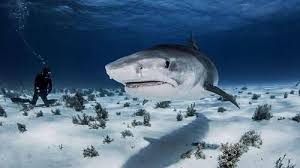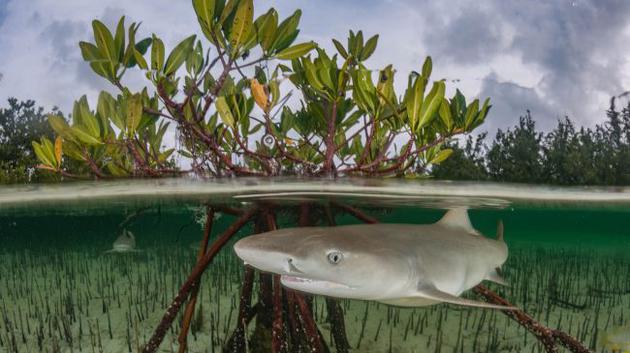
What If There Were No Sharks?
Advertisement
In fact, gray reef shark forays between coastal waters and the deep sea in the Pacific Ocean's Palmyra Atoll bring the reef more than 200 lbs. (95 kilograms) of nutritious nitrogen per day.
A Murky Future

Approximately 25% of all shark, skate and ray species are currently threatened with extinction, according to the Smithsonian Institution’s Ocean Portal. Because sharks have few babies and are slow to mature, their numbers aren’t replenishing quickly enough to keep up with losses from commercial fishing, Daly-Engel said.
In recent decades, some shark populations have declined by up to 90%, reflecting an unsustainable trend of overexploitation in ocean habitats, according to Bortoluzzi.
“Many species also face the loss of habitats, with refuge areas such as mangroves being destroyed to accommodate our growing human population, and habitats such as seabed and reefs being damaged by destructive fishing methods such as trawling,” Bortolozzi said.
Advertisement
What does the future hold for sharks? Federal legislation and international treaties such as the Convention on International Trade in Endangered Species of Wild Fauna and Flora can help to protect vulnerable populations. But many shark species are poorly understood, which can hinder conservation efforts, said Michael Scholl, CEO of the nonprofit Save Our Seas Foundation.
“Government institutions must have validated information to support significant decline in populations, for example,” Scholl told Live Science in an email. To that end, Save Our Seas works alongside marine researchers to gather shark data that can inform much-needed protective measures; the nonprofit also works to raise public awareness of shark diversity and its importance to their marine ecosystems, Scholl said.
But sharks may be running out of time. And if they were to disappear, the repercussions on ocean food webs would ultimately affect humans, too.
“Fisheries may collapse, with artisanal fishers being the likely most affected, and popular tourism destinations which rely on sharks to attract tourists will also suffer greatly,” Bortoluzzi said.
“It’s important to understand that as much as our oceans need sharks, so do we.”
Advertisement
- Previous article
- Does Water Boiled in Microwave Tastes Different?
- Next article
- Why Do Certain People Eat A Lot, But Never Gain Weight?
Advertisement
OTHER NEWS

Watch Dogs: Legion Review II
BY Cynthia

New Research has Found :The Earth’s Core is Only a Billion Years Old
BY Deborah

Why We Get Goosebumps?
BY Roberts

The Asphalt Around Roads Could Be A Problem
BY Robinson

Australia Introduced to Parliament Legislation to Force Tech Giants Google and Facebook to Pay for News
BY James

UK Government to ban Installation of Huawei’s 5G Network
BY Watson
RECENT NEWS
-

PUBG Mobile Esports Generated 200 Million Hours of Viewing in 2020
-

Mario Kart Tour Races to $200M revenue and 200M Downloads
-

Game Acquisitions Expand Globally in Q1 2021 with 280 Deals Worth $39 Billion Surpassing That in 2020
-

Free Fire Shows Strong Momentum, with Its Revenue Overtaking PUBG Mobile in a Single Market for Q1 2021
-

The Games Fund Launched a $50 Million Early Investment Fund to Invest in American and European Companies
-

How to Download and Install Wyze App for Free?
 1
1 1
1